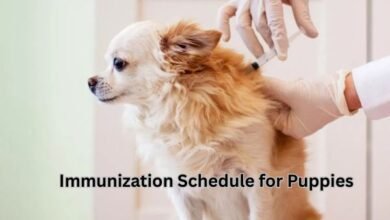
Pop Tarts are a beloved snack, cherished for their convenience and wide array of flavors. These toaster pastries feature a sweet filling encased in a thin pastry crust, often topped with icing. Popular flavors include strawberry, chocolate fudge, and cinnamon, among many others. Common ingredients in Pop Tarts include enriched flour, sugar, corn syrup, vegetable oils, and various artificial flavorings and preservatives that contribute to their unique taste and extended shelf life.
While Pop Tarts are a hit among humans, it’s important to consider the curiosity of our canine companions towards human food. Dogs are naturally intrigued by what we eat, but not all human snacks are safe for them so can dog eat pop tarts?. Understanding the potential risks associated with feeding Pop Tarts to dogs can help pet owners make informed decisions about their pets’ diet and health.
Nutritional Content of Pop Tarts
Pop Tarts, while popular among humans, pose concerns when considering their nutritional content in relation to dogs‘ dietary requirements:
High Sugar and Carbohydrate Content: Pop Tarts are characterized by elevated levels of sugar and carbohydrates, contributing to their sweet taste and high energy content. However, excessive sugar and carbohydrate intake can lead to weight gain, insulin spikes, and other metabolic issues in dogs.
Presence of Artificial Additives, Flavors, and Preservatives: Pop Tarts commonly contain artificial additives, flavors, and preservatives to enhance taste, texture, and shelf life. While deemed safe for human consumption within regulatory limits, these additives may not align with dogs’ natural dietary preferences and can potentially trigger adverse reactions or sensitivities.
Lack of Essential Nutrients for Dogs‘ Dietary Needs: Despite their palatability to humans, Pop Tarts lack essential nutrients necessary for fulfilling dogs’ dietary needs. Dogs require a balanced diet rich in proteins, fats, vitamins, and minerals to maintain optimal health and wellbeing. The absence of these vital nutrients in Pop Tarts renders them unsuitable as a staple food for dogs.
Immediate Health Risks for Dogs

Understanding the immediate health risks associated with certain foods is essential for responsible pet care, particularly when it comes to the dietary choices for dogs. In the case of Pop Tarts, while they may be a tempting snack for humans, they can pose significant risks to canine health. Exploring the immediate health risks for dogs consuming Pop Tarts sheds light on the importance of making informed decisions regarding pet nutrition.
Gastrointestinal Upset
One of the primary immediate health risks for dogs consuming Pop Tarts is gastrointestinal upset, which can manifest in various ways:
Potential Vomiting: The rich and sugary composition of Pop Tarts may irritate a dog’s stomach lining, leading to episodes of vomiting shortly after ingestion.
Diarrhea: The high sugar and fat content in Pop Tarts can disrupt a dog’s digestive system, resulting in loose stools or diarrhea.
Stomach Discomfort: Dogs may experience general discomfort or abdominal pain after consuming Pop Tarts, indicating digestive distress.
Allergic Reactions to Artificial Additives or Flavorings
The presence of artificial additives and flavorings in Pop Tarts increases the risk of allergic reactions in dogs:
Sensitivity to Artificial Colors: Some dogs may have allergic reactions to artificial colors used in Pop Tarts, leading to symptoms such as itching, hives, or more severe reactions.
Intolerance to Artificial Flavors: Certain artificial flavorings can trigger adverse reactions in dogs, ranging from gastrointestinal upset to skin irritations and respiratory issues.
Risk of Pancreatitis Due to High Fat Content
The high fat content in Pop Tarts poses a significant risk of pancreatitis in dogs:
Pancreatic Inflammation: Excessive consumption of high-fat foods like Pop Tarts can trigger pancreatitis in dogs, characterized by inflammation of the pancreas and associated symptoms such as abdominal pain, lethargy, and vomiting.
Potential Complications: Severe cases of pancreatitis can lead to complications such as dehydration, organ failure, and even death if left untreated.
Feeding Pop Tarts to dogs can result in immediate health risks such as gastrointestinal upset, allergic reactions, and pancreatitis. Pet owners should exercise caution and avoid offering Pop Tarts to their canine companions to prevent potential adverse health effects.
Long-term Health Consequences of Pop Tarts
Considering the long-term health consequences of feeding certain foods to dogs is crucial for maintaining their overall health and wellbeing. In the case of Pop Tarts, while they may be convenient and tasty for humans, they can pose significant risks to canine health over time. Exploring the long-term health consequences of dogs consuming Pop Tarts sheds light on the importance of mindful dietary choices for pet owners.
Obesity and Related Health Issues
Prolonged consumption of Pop Tarts can contribute to obesity and related health issues in dogs:
Excessive Calorie Intake: Pop Tarts are calorie-dense snacks, and regular consumption can lead to an imbalance in a dog’s energy intake, resulting in weight gain.
Obesity-Related Health Issues: Dogs that become overweight or obese due to high-calorie snacks like Pop Tarts are at increased risk of developing various health issues, including joint problems, cardiovascular diseases, and respiratory difficulties.
Increased Risk of Diabetes
The high sugar content in Pop Tarts presents a long-term risk of diabetes in dogs:
High Sugar Consumption: Regular consumption of sugary snacks like Pop Tarts can lead to insulin resistance in dogs, increasing their susceptibility to diabetes mellitus.
Diabetes-Related Complications: Dogs with diabetes may experience complications such as neuropathy, cataracts, urinary tract infections, and impaired wound healing, impacting their quality of life and longevity.
Dental Problems
The sugary content of Pop Tarts can contribute to dental problems in dogs over the long term:
Tooth Decay: The sugars present in Pop Tarts can promote the growth of harmful bacteria in a dog’s mouth, leading to tooth decay and cavities over time.
Gum Disease: Prolonged exposure to sugary snacks can also increase a dog’s risk of developing gum disease, characterized by inflammation, bleeding gums, and bad breath.
Feeding Pop Tarts to dogs can result in long-term health consequences such as obesity, diabetes, and dental problems. Pet owners should prioritize providing their canine companions with a balanced and nutritious diet. To promote optimal health and wellbeing throughout their lives.
Considerations for Feeding Pop Tarts to Dogs
When considering feeding Pop Tarts to dogs, several important factors should be taken into account. To ensure the health and wellbeing of our canine companions. Understanding these considerations can help pet owners make informed decisions about their dogs‘ diets and treat options.
Potential Situational Use as an Emergency Treat (with Caution)
Pop Tarts are not recommended as a regular part of a dog’s diet. There may be situations where they could be used as an emergency treat:
Emergency Situations: In emergencies where no other suitable treats are available, a small piece of Pop Tart may be offered as a temporary solution to reward or entice a dog. However, this should be a rare occurrence and limited to genuine emergencies.
Caution: If using Pop Tarts as an emergency treat, opt for varieties with minimal artificial additives and flavors. Monitor the dog closely for any adverse reactions and consult a veterinarian if concerns arise.
Alternatives to Pop Tarts for Dogs
Pet owners have several alternatives to Pop Tarts when seeking treats for their dogs:
Commercial Treats: Many pet stores offer a wide variety of dog treats specifically formulated to meet canine nutritional needs. Look for treats that are low in sugar, contain wholesome ingredients, and are designed for dogs’ digestive systems.
Homemade Snacks: Pet owners can prepare homemade treats using dog-friendly ingredients such as lean meats, vegetables, fruits (in moderation), and whole grains. Homemade snacks offer the benefit of controlling ingredients and avoiding additives present in processed foods.
Importance of Moderation and Avoiding Regular Consumption
Regardless of the circumstances, moderation is key when it comes to feeding Pop Tarts to dogs:
Limited Indulgence: Pop Tarts should only be given to dogs occasionally. And in small quantities to minimize the risk of adverse health effects.
Avoid Regular Consumption: Due to their high sugar, fat, and additive content. Pop Tarts are not suitable for regular consumption by dogs. Over time, frequent intake can lead to obesity, diabetes, dental problems, and other health issues.
While Pop Tarts may seem appealing as a treat for dogs. Pet owners should prioritize alternatives specifically designed for canine consumption. If considering the use of Pop Tarts in emergencies, it’s essential to exercise caution and prioritize the health. And wellbeing of furry companions through moderation and informed decision-making.
Veterinary Perspective and Conclusion
From a veterinary standpoint, it is strongly advised against feeding Pop Tarts to dogs due to their unsuitability for canine consumption:
Nutritional Inadequacy: Pop Tarts lack essential nutrients required for dogs’ health and wellbeing, including adequate protein, vitamins, and minerals.
Potential Health Risks: The high sugar, fat, and additive content in Pop Tarts can lead to obesity, diabetes, gastrointestinal upset. Dental problems, and other adverse health effects in dogs.
Lack of Dietary Balance: Feeding Pop Tarts to dogs can disrupt the balance of their diet, leading to nutritional deficiencies and long-term health complications.
Encouragement to Provide a Balanced and Nutritious Diet Tailored to Dogs’ Needs
Pet owners are encouraged to prioritize providing their dogs with a balanced and nutritious diet that meets their specific dietary requirements:
Complete and Balanced Nutrition: Dogs require a diet rich in high-quality protein. Healthy fats, vitamins, and minerals to support their overall health, immune function, and energy levels.
Suitable Alternatives: Opt for dog-friendly treats and snacks specifically formulated to meet canine nutritional needs. Ensuring they are low in sugar, free from harmful additives, and easy to digest.
Reminder to Consult with a Veterinarian for Personalized Dietary Advice for Individual Dogs
Individual dogs may have unique dietary needs and health considerations, making it essential to seek personalized advice from a veterinarian:
Tailored Dietary Recommendations: A veterinarian can provide expert guidance on selecting the most suitable diet for a dog. Based on factors such as age, breed, size, activity level, and any underlying health conditions.
Monitoring and Adjustments: Regular consultations with a veterinarian allow for ongoing assessment of a dog’s dietary requirements. Adjustments to their diet as needed to promote optimal health and wellbeing.
Conclusion
In conclusion, Pop Tarts are not recommended for feeding to dogs due to their nutritional inadequacy and potential health risks. Pet owners should prioritize providing their canine companions with a balanced and nutritious diet. Best to their specific needs and consult with a veterinarian for personalized dietary advice. By making informed dietary choices and prioritizing their dogs’ health. Pet owners can help ensure their furry friends lead long, happy, and healthy lives.




